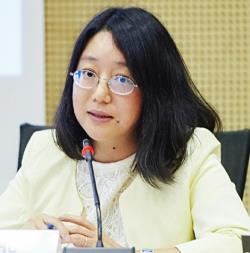Human Rights-Centered Global Governance of Quantum Technologies: Implications for AI, Digital Rights, and the Digital Divide
United Nations Educational, Scientific and Cultural Organization (UNESCO) , European University Institute (EUI), Delft University of Technology (TU Delft)/ Quantum Delta
Session 176
The potential of quantum technologies promise transformative advancements in encryption, privacy, security, and computational power, which has fueled significant investments in quantum technologies.
As with artificial intelligence (AI), quantum technologies also require proactive governance and policy responses to ensure their development aligns with human rights principles. While quantum innovations can offer significant opportunities, they pose ethical and human rights challenges, including potential risks to freedom of expression, access to information, and the widening of multidimensional global digital inequities. In line with its Strategic Plan 2023-2029, UNESCO's Information for All Programme (IFAP), jointly with partners: European University Institute (EUI) and Tech and Global Affairs Innovation Hub, Sciences Po, presents this Issue Brief: "Human Rights Centered Global Governance of Quantum Technologies: Advancing Information for All".
In alignment with C3, C7 and C10 of the WSIS+20 review, initial findings and recommendations from the Brief aim to trigger policy discussions on how to embed ethical and human rights considerations into emerging quantum technology governance for the public interest. The Brief expands on the “Quantum technologies and their global impact: discussion paper” published by UNESCO and was developed as a continuation of the 2024 WSIS+20 High-Level session on "Pioneering responsible global governance for Quantum technology".
The aim of the interactive roundtable, is to highlight the following key recommendations from the Issue Brief:
(i) Examine the role of global governance frameworks, such as the Universal Declaration of Human Rights (UDHR), in shaping ethical quantum development.
(ii) Discuss the responsibility of different stakeholders in the quantum innovation ecosystem to align technological advancements with ethical and societal needs.
(iii) Promote policy interventions, awareness campaigns, and inclusive research initiatives to empower marginalised stakeholders in shaping the future of quantum technologies.






-
 C3. Access to information and knowledge
C3. Access to information and knowledge
-
 C7. ICT applications: benefits in all aspects of life — E-government
C7. ICT applications: benefits in all aspects of life — E-government
-
 C7. ICT applications: benefits in all aspects of life — E-learning
C7. ICT applications: benefits in all aspects of life — E-learning
-
 C7. ICT applications: benefits in all aspects of life — E-employment
C7. ICT applications: benefits in all aspects of life — E-employment
-
 C7. ICT applications: benefits in all aspects of life — E-environment
C7. ICT applications: benefits in all aspects of life — E-environment
-
 C7. ICT applications: benefits in all aspects of life — E-science
C7. ICT applications: benefits in all aspects of life — E-science
-
 C10. Ethical dimensions of the Information Society
C10. Ethical dimensions of the Information Society
-
 Goal 5: Achieve gender equality and empower all women and girls
Goal 5: Achieve gender equality and empower all women and girls
-
 Goal 8: Promote inclusive and sustainable economic growth, employment and decent work for all
Goal 8: Promote inclusive and sustainable economic growth, employment and decent work for all
-
 Goal 9: Build resilient infrastructure, promote sustainable industrialization and foster innovation
Goal 9: Build resilient infrastructure, promote sustainable industrialization and foster innovation
-
 Goal 10: Reduce inequality within and among countries
Goal 10: Reduce inequality within and among countries
-
 Goal 16: Promote just, peaceful and inclusive societies
Goal 16: Promote just, peaceful and inclusive societies
-
 Goal 17: Revitalize the global partnership for sustainable development
Goal 17: Revitalize the global partnership for sustainable development